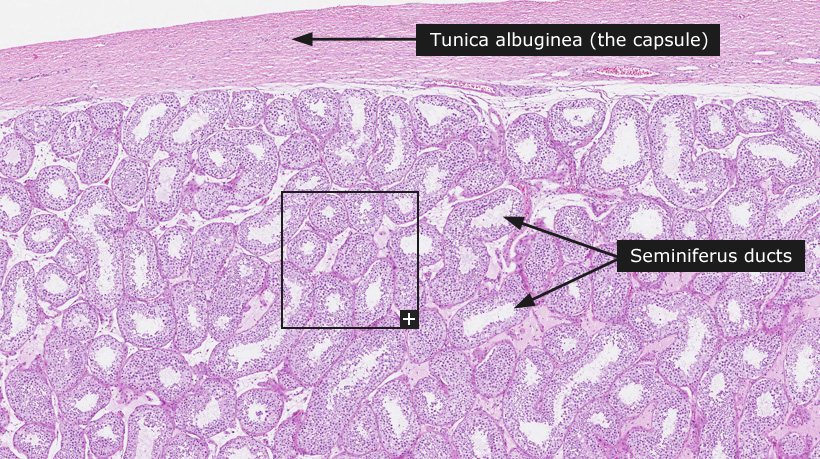DictionaryTestisTestis
TestisThe testes constitute a paired organ, surrounded by layers of connective tissue, including the tunica albuginea. The testes are suspended in the scrotum by the spermatic cord, including the vas deferens. The main function of the testes is to produce the male germinal component (sperm) needed for reproduction and furthermore the testes are also important for the production of several hormones, including androgens. The testis is structured in lobules separated by fibrous septa. Each lobule contains 1-4 seminiferous ducts. The highly coiled seminiferous ducts debouch into the rete testis, which connects to the vas deferens. The seminiferous ducts that are surrounded by a layer of thin connective tissue dominate the testis and contain germ cells and Sertoli cells. Germ cells are derived from tissues in the yolk sac and are capable of undergoing meiosis in their maturation towards mature sperms. Maturation takes approximately 70 days. Germ cells comprise the bulk of cells present in seminiferous ducts. Several complex steps that include stages of maturation, can be morphologically determined and visualized in cross sections from seminiferous ducts. These stages include undifferentiated spermatogonia in the basal compartment followed by more luminal mature spermatocytes and spermatids. The Sertoli cells are hormone producing non-dividing columnar cells that are attached to the basement membrane and display cytoplasmic extensions around the germinal cells. Sertoli cells have irregular nuclei with a typical prominent nucleolus. The stroma surrounding the seminiferous ducts is composed of loose connective tissue containing hormone producing Leydig cells and blood vessels, lymphatics, nerves together with few macrophages and mast cells. The Leydig cells are found in small clusters or as single cells in the interstitium between seminiferous ducts. Typically Leydig cells display an abundant cytoplasm, containing lipid droplets and lipofuscin pigment, and a round, vesicular nucleus.
Cancer: Testis cancer |